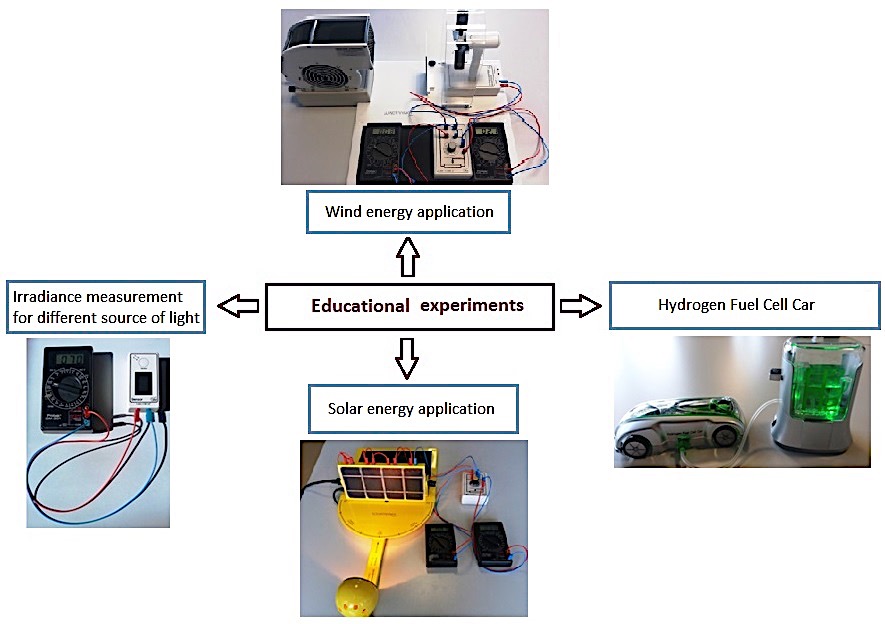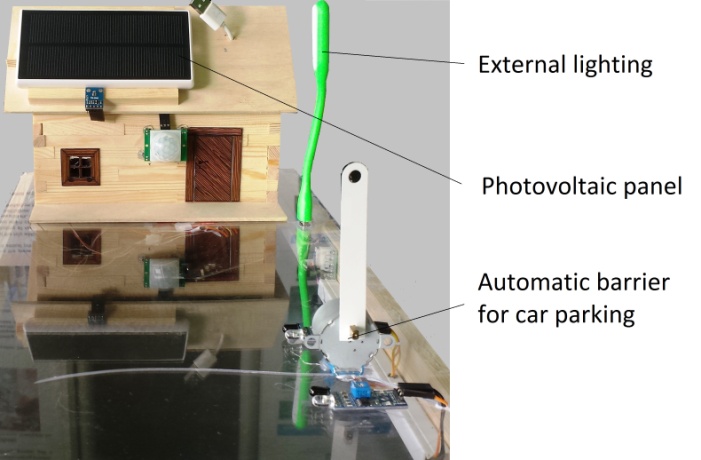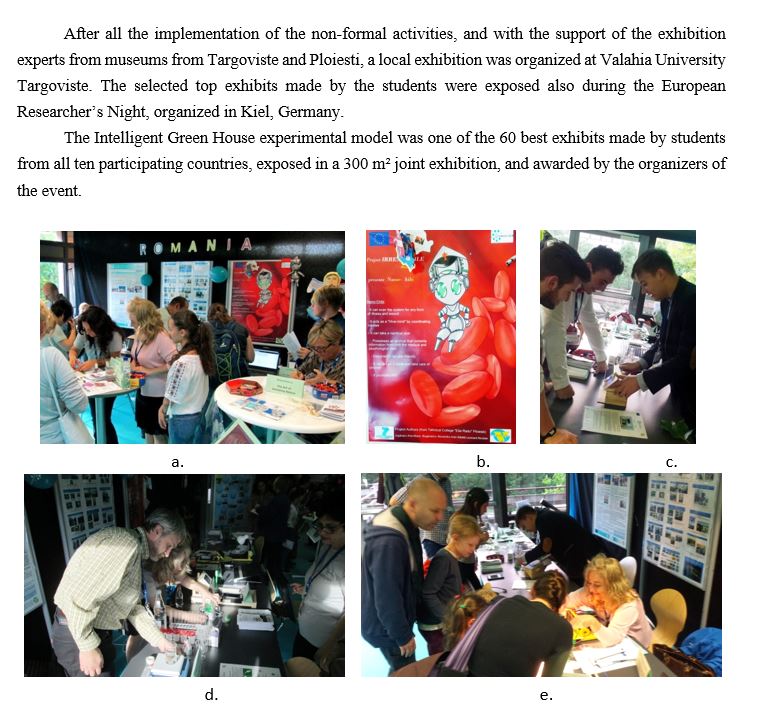Promoting Sustainable Energy Through Demonstrative Kits And Applications Having Educational Valences
Abstract
The context in which the research called in this paper was made was strongly connected to the European and Romanian context of restructuring the energy sector: leaving the conventional and CO2 emitting energy production, using the renewable energy systems and advanced information and communication technologies issues, respecting the
Keywords: Responsible Research and InnovationNon-formal EducationSustainable EnergyDemonstrative KitsRenewable Energy Applications
Introduction
In the last years, the ecological problems were represented the source of the sociological, educational and economic analyzes with important influences in the people’s life, consumption behaviors and energy production. One of the scales developed for determining environmental approach is the
We are approaching the limit of the number of people the Earth can support.
Humans have the right to modify the natural environment to suit their needs.
When humans interfere with nature, it often produces disastrous consequences.
Human ingenuity will insure that we do not make the Earth unlivable.
Humans are seriously abusing the environment.
The Earth has plenty of natural resources if we just learn how to develop them.
Plants and animals have as much right as humans to exist.
The balance of nature is strong enough to cope with the impacts of modern industrial nations.
Despite our special abilities, humans are still subject to the laws of nature.
The so-called “ecological crisis” facing humankind has been greatly exaggerated.
The Earth is like a spaceship with very limited room and resources.
Humans were meant to rule over the rest of nature.
The balance of nature is very delicate and easily upset.
Humans will eventually learn enough about how nature works to be able to control it.
If things continue on their present course, we will soon experience a major ecological catastrophe.
At the same time, for the energy sector, many studies have identified the building sector as an area with great energy consumption; in particular, the energy used in buildings represents about 40% of the European Union total final energy consumption and CO2 emissions. To support the energy solving and environmental problems, the European Union has promoted measures which establish that starting from the end of 2020, all new buildings will have to be
In this general context and concerning the renewable energy area, this is focused to how to make design non-formal education activities dedicated to
Problem Statement
Energy is a very important feature of our modern lives, because it is so necessary, in our homes, in workplaces, in transport and communications. It is well known that the energy crisis had a negative impact on fuel prices and oil depletion. From the need to replace the conventional energy systems with the green and sustainable energy sources, the renewable energy area has an efficient growth in demand of energy, having the support of European Union, Japan and USA policies. Concerning the energy features and subjects as global warming, pollutant emissions, health and security, the mission of the educational system is to give a better knowledge and understanding of the renewable energy sources with their energy supply options and impact on our society and environment.
Starting from the idea that it is important that all students must have knowledge regarding the features and benefits of environmental issues, with the view to increase awareness about preventive measures to be applied for energy saving, this paper proposes non-formal educational activities in full compliance with Romanian and European targets, on restructuring of the energy sector according to the following aspects:
leaving conventional energy production and CO2 emitting;
using of renewable energy applications;
reducing energy consumption in buildings;
applying related issues of information and communication technologies (ICTs).
The societal impact of education in renewable energy area
In accordance with the general scientific opinions regarding the uncontrolled exploitation of the resources and the need to find and implement alternatives energy sources, planners and designers have explored and elaborated, for the future decades, various approaches to sustainable urban development. At the same time, ICTs are proposed as successful devices, for the sustainability application and for the interpretation of each level of development of intelligent buildings and for future cities. In this sense, education in the energy area should have an important role in the development of a sustainable society with its influence regarding the promotion of public awareness and consumer confidence for new technologies. To offer sustainable solutions for future cities, including applications of energy systems, renewable energy education is required in formal, non-formal or informal training, from early ages.
Responsible Research and Innovation Aspects and “Intelligent Buildings” / “Smart Cities” topics
Several approaches of renewable energy education introduced in the past years in Romania were based on an assessment of the needs of our society. In accordance with the Romanian education targets, research and innovation for Renewable Energy Sources - especially in Solar Energy and Wind Energy - claim to make some changes in students’ education. In formal education, there is not a dedicated support for teaching renewable energy, the students’ perception being recorded as a subject insufficiently tackled in classrooms (Dina, Crăciun, Bulgariu, & Antohe, 2012). In this respect, the objective goes to the other channel: to illustrate the topic and train the students especially in the frame of non-formal activities, in order to be able to understand and to assist the future transition with a greater reliance on renewable power energy and with applications in efficient and intelligent buildings.
For the chosen topics -
Research Questions
During the projection of the non-formal educational activities, a special emphasis has been placed on the role that young student should felt for the environmental protection, against the pollutant emissions resulting from burning the fossil fuels. In this respect, two issues have been addressed: (a) what is the role of young students, and (b) how can be introduced the dimensions of
The role of the young students in the actual society
As citizens and consumers of energy in their daily life, the students analysed and responded with responsibly to the challenges offered by questions such as:
Is our responsibility to replace the natural energy sources with renewable energy sources?
What are the principal characteristics of the renewable energy systems?
How can we analyse the physical phenomena that allow the conversion of solar energy and wind energy into electricity?
Can we use the knowledge gained in the determination of the specific parameters of photovoltaic solar applications: maximum electrical power, electrical and thermal efficiency?
How can we apply the solar energy storage?
Is the hydrogen production a good solution for the solar energy storage?
Is the hydrogen fuel cell car a good application for the future mobility?
How can we imagine the home of the future?
Responsible Research and Innovation and non-formal educational activities
All Responsible Research and Innovation (
Engagement highlighting the role of relevant stakeholders (researchers, teachers, students) related to applications of solar energy inintelligent building /smart cities ;Gender Equality ensuring optimal representativeness of women (students, researchers and teachers) related to applications of nanomaterials in the solar energy area;Science Education handling the students with knowledge and necessary skills for participation in research and innovation processes, with respect to applications of renewable energy sources;Open Access ensuring the transparency and easy access to all results of research and innovation, with the view to its stimulating and its adequate valorising at social level. This principle was strongly met when students are visiting the Scientific and Technological Institute of Multidisciplinary Research - Energy Environment Research Department, from Valahia University Targoviste;Ethics respecting and valuing the principles of ethics in research and innovation processes – this is important to be mentioned, especially when researchers have initiated conversations with students, having in attention the issues related to the scientific, social, economic and moral implications of the future of cities;Governance becoming aware concerning the role of policy makers on preventing / controlling of some research and innovation efforts that can disregard the ethical principles and lead to social harm. According to this dimension, the students express personal point of views in relation to the importance of involving social actors in scientific research.
Purpose of the Study
In the framework of the FP7 European Project entitled

For designing in practice, several workshops and exhibitions were organized, experiences and good practice examples were promoted, in the regard to continuous development of education and in the respect of responsible research and innovation in renewable energy area.
In order to achieve essential and relevant learning issues, non-formal educational activities were organized for different groups of students. In this sense, 200 students from primary and secondary levels (50 - primary, 75 - lower secondary, 75 - upper secondary) and members of the Romanian IRRESISTIBLE Community of Learners (35 - Science teachers - Physics, Chemistry, Biology, near educational experts, researchers and museum staff) participated to the proposed activities.
Exhibitions and workshops under the topic of The World of Tomorrow and the Future Energy and Smart Cities and Renewable Energy Sources were presented in the frame of the National week: “School in Another Way: To know more, to be better!” at Scientific and Technological Institute of Multidisciplinary Research - Energy Environment Research Department of Valahia University Targoviste (ICSTM-UVT), and at the National College “Elie Radu” from Ploiesti, including also experimental applications made by students.
An educational movie dedicated to the renewable energies was presented to the students in the framework of the workshops.
Educational support for non-formal activities
The educational support proposed by the promoters of exhibitions and workshops has the structure illustrated in Figure

Research Methods
In the frame of the IRRESISTIBLE Project, it was performed the educational support (Module) called:

During the projected non-formal activities and using the educational kits, students were able to conduct their own experiments and analyses in the following directions:
Identifying and comparing the characteristics of the renewable energy systems;
Analysing the physical phenomena that allow the conversion of solar energy and wind energy into electricity;
Using the acquired knowledge in the determination of the specific parameters of photovoltaic solar applications: maximum electrical power, electrical and thermal efficiency;
Applying the solar energy storage on hydrogen production with application concerning the hydrogen fuel cell car;
Analysing the wind energy conversion for different parameters and environmental data;
Making scientific factsheets and demonstrations with experimental kits.
Findings
As main result, a demonstrative model called

The demonstrative model is equipped with a block structure composed of an alarm system and specifically sensors for detection of motion, high levels of smoke or gas, inside the house. Also, for the car parking in the near of the house it uses an automatic barrier that rises and lowers for crossing the car.
The demonstrative model was characterized by the workshop and exhibition visitors, taking into account 4 different categories: usage of green energy, safety, possibility for monitoring, intelligence (Table
The demonstrative model was exhibited at a big event - the
Concerning the organization of such non-formal educational activities, the teachers’ feedback was very favourable, mostly to the fact that they developed skills to guide students during the process, and, on the other hand, students have developed skills to better communicate the content of the activities and RRI features, as following:
applying the knowledge gained in the determination of the parameters of solar energy applications;
expressing personal opinion, associated with a responsible attitude with regard to the green energy production and efficient energy;
presentation and argumentation of own opinions regarding the smart cities and intelligent buildings;
arguing on the advantages and disadvantages of using renewable energy systems for a net zero energy building;
expressing personal views about the importance of involving social actors in scientific research in the regards of smart cities and intelligent homes.
After all the implementation of the non-formal activities, and with the support of the exhibition experts from museums from Targoviste and Ploiesti, a local exhibition was organized at Valahia University Targoviste. The selected top exhibits made by the students were exposed also during the European Researcher’s Night, organized in Kiel, Germany.
The Intelligent Green House experimental model was one of the 60 best exhibits made by students from all ten participating countries, exposed in a 300 m² joint exhibition, and awarded by the organizers of the event.

Conclusion
The education in the renewable energy area, made in non-formal settings, have an important impact on the formal one. Some concepts and methods used in non-formal activities for renewable energy are still relatively new for the Romanian curricula for Sciences.
The results of non-formal activities in renewable energies have created important senses and reactions in the teachers’ and students’ community regarding the public information, for helping and engaging people to make the necessary steps to a low carbon society and for the development of intelligent buildings and smart cities.
Acknowledgments
This work was funded through the Seventh Framework Programme Project “IRRESISTIBLE - Including Responsible Research and Innovation in Cutting Edge Science and Inquiry-based Science Education to Improve Teacher's Ability of Bridging Learning Environments” - a coordination and support action under FP7-SCIENCE-IN-SOCIETY-2013-1, ACTIVITY 5.2.2 “Young people and science” - Topic SiS.2013.2.2.1-1: Raising youth awareness to Responsible Research and Innovation through Inquiry Based Science Education. This project has received funding from the European Union’s Seventh Framework Programme for research, technological development and demonstration, under grant agreement no 612367. The support offered by the European Commission, through the project mentioned above, is gratefully acknowledged.
The authors expressed thanks to Mr. Gabriel State, Physics teacher at National College “Ienăchiță Văcărescu”, Târgoviște, Romania, and to students who participated in the activities organized at European Researcher’s Night, in Kiel, Germany.
The illustrated model (presented in this paper) involved the work of two students who actively participated in workshops and exhibition designing, Eusebiu Barbu (National College “Constantin Carabella”, Targoviste) and Teodor Hossu (National College “Ienăchiță Văcărescu”, Targoviste) under the direct guidance of the Physics teacher Gabriel State (National College “Ienăchiță Văcărescu”, Targoviste)
Special thanks are also going to all those who contributed to the project “Development CDI - Scientific and Technological Institute of Multidisciplinary Research”, implemented in the frame of the Structural Operational Programme for increasing the Economic Competitiveness POSCCE-A2-O2.2.1-2009-4. The main research direction targeted by the project was oriented on Renewable Energy Resources (RES), which required applications related to the solar energy conversion.
References
- Anderson, M. (2012). New Ecological Paradigm Scale (NEP). London, UK: Berkshire Publishing Group.
- Atav, E., Altunoğlu, B. D., & Sönmez, S. (2015). The Determination of the Environmental Attitudes of Secondary Education Students. Procedia - Social and Behavioral Sciences, 174, 1391-1396.
- Dina, N., Crăciun, S., Bulgariu, M., Antohe, S. (2012). Teaching of Alternative Energy Sources in Romanian School. Romanian Reports in Physics, 64(3), 868–877.
- Directive 2010/31/EU on the energy performance of buildings (recast), 19 May 2010, http://www.buildup.eu/en/practices/publications/directive-201031eu-energy-performance-buildings-recast-19-may-2010
- Măntescu G., Gorghiu G., & State G. (2016). Responsible Research and Innovation in Non-Formal Education Activities Related to Solar Energy Area. In: A. Sandu, A. Frunză, T. Ciulei & L. M. Gorghiu, Proceedings of the 7th LUMEN International Conference - Multidimensional Education & Professional Development. Ethical Values, 309-315.
Copyright information

This work is licensed under a Creative Commons Attribution-NonCommercial-NoDerivatives 4.0 International License.
About this article
Publication Date
30 July 2017
Article Doi
eBook ISBN
978-1-80296-026-6
Publisher
Future Academy
Volume
27
Print ISBN (optional)
-
Edition Number
1st Edition
Pages
1-893
Subjects
Teacher training, teaching, teaching skills, teaching techniques,moral purpose of education, social purpose of education, counselling psychology
Cite this article as:
Măntescu, G., Gorghiu, G., & Gorghiu, L. M. (2017). Promoting Sustainable Energy Through Demonstrative Kits And Applications Having Educational Valences. In A. Sandu, T. Ciulei, & A. Frunza (Eds.), Multidimensional Education and Professional Development: Ethical Values, vol 27. European Proceedings of Social and Behavioural Sciences (pp. 372-382). Future Academy. https://doi.org/10.15405/epsbs.2017.07.03.45

